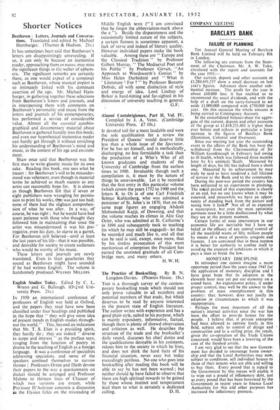IN 1950 an international conference of professors of English was
held at Oxford, and the papers they read have now been classified under four headings and published in the hope that " they will give some idea of present trends in English studies through- out the world." This, beyond an indication that Mr. T. S. Eliot is a presiding spirit, they hardly do ; they are indeed " diverse in scope and interest " as the preface says, ranging from the function of poetry in drama to the teaching of English as a foreign language. It was a conference of specialists addressing specialists, and some of the speakers confined themselves to narrow themes : Professors Orton and Dieth devote their papers to the way a questionnaire on dialect should be arranged and Professor Malone to thirteen lines of Chaucer of which two versions are extant, while Professor D'Ardenne concocts a discussion in the Elysian fields on the misreading of Middle 'English texts (" I am convinced that he forgot the abbreviation-mark above the e "). Beside the disparateness and the occasionally limited nature of the subjects, a certain flatness is sometimes apparent, a lack of verve and indeed of literary quality. However individual papers make the book valuable. Among these are " Europe and the Classical Tradition " by Professor Gilbert Murray, " The Mediaeval Poet and his Public " by Professor Girvan, "An Approach to Wordsworth's Genius " by Miss Helen Darbishire and " What is Literature 1-For ? " by Professor Bonamy Dobree, all with some distinction of style and energy of idea. Lord Lindsay of Birker is hard-hitting and far-sighted in his discussion of university teaching in general.
G.F.


































 Previous page
Previous page